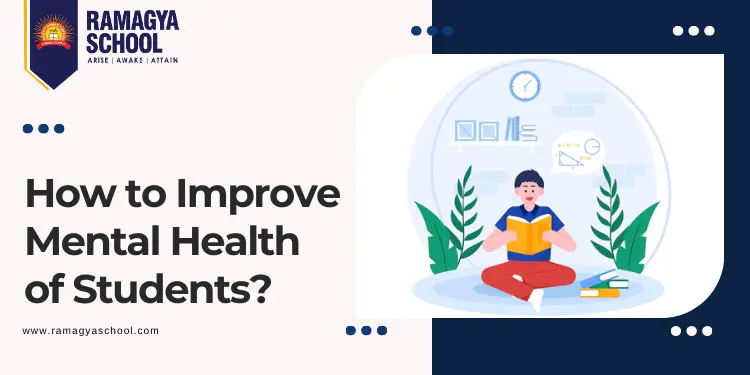How to improve the mental health of students? These days, parents ask questions like these the most. Students are under a lot of strain academically, which makes it difficult for them to find time for their interests.
In our busy and cutthroat world, mental health is more important than ever for kids. Finding time for rest and relaxation in between our responsibilities and commitments is essential to maintaining our wellbeing. Engaging in hobbies is a great method to maintain mental health!
This blog explores activities proven to increase well-being and how hobbies impact mental health in students. It will also explore some key points to be developed as a hobby to answer how to improve the mental health of students. Every pastime offers something special. Creative endeavors like painting and crafting, athletics, and yoga offer advantages in their own right. Students who incorporate hobbies into their daily lives may build resilience, form positive mental health habits, and more easily navigate academic and personal challenges than ever before.
Top Activities to Increase your Mental Health
Here is a list of some activities that can help in increasing your mental health:
Hobby |
Benefits |
Reading |
Reading enhances vocabulary and cognitive abilities. You can de-stress and feel less anxious by reading books. It also encourages a more peaceful, pleasant state of mind. It promotes mindfulness by keeping the narrative front and center and eliminating unfavorable ideas. |
Outdoor Activities |
Exercises like cycling, hiking, or sports improve mental health and mood by releasing endorphins. Nature promotes relaxation and calmness. This allows a person to break from academic demands or office stress. Outdoor activities also encourage social interaction, teamwork and interpersonal skills, and the building of solid support networks. |
Artistic Pursuits |
Painting, drawing or other artistic activities can improve the mental health of students. Students can express themselves and transform their ideas and feelings into real art through these exercises. Making art is a beautiful way to decompress and reduce tension after a demanding day. Students’ ability to solve problems can be developed as they experiment with various materials and methods. |
|
Music |
It has been proved that taking up an instrument or enjoying music helps lower tension, anxiety, and depressive symptoms. The melodies and rhythms have the ability to soothe the mind and encourage relaxation. An excellent medium for self-expression and emotional channeling is music. Music improves memory and cognitive function by stimulating the mind. |
Exercise |
Exercises, including cycling, swimming, walking, and sports, release endorphins. Happiness-inducing neurotransmitters are in charge of this. Stress chemicals like cortisol and adrenaline can be lowered by exercise. With this tool, students can effectively control their anxiety and despair. Better sleep patterns are encouraged by exercise, and sleep is essential for maintaining emotional and mental balance. |
Gardening |
Spending time outside, tending to plants, and maintaining green spaces are proven ways to reduce stress and enhance relaxation. Gardening helps students connect with nature while relieving academic work’s pressures. Watching plants grow up gives a sense of accomplishment which increases self-esteem. Additionally gardening increases outside as well as sun exposure, both of which have proven invaluable for relieving symptoms of depression and anxiety[1]. |
Journaling |
Students can process emotions and patterns of behavior by putting their thoughts and feelings on paper. Journaling provides students a safe place to express frustrations, fears and anxieties. This reduces stress and promotes emotional release. Documenting positive experiences can also boost self-esteem, cultivate gratitude and optimism and increase confidence. Journaling also fosters creativity, problem-solving and critical thinking skills in students as they explore new ideas. |
Volunteering |
Students who volunteer are able to cultivate a sense of connection and community. Volunteering and improving the lives of others are two ways that students might increase their sense of self-worth. Students’ viewpoints and experiences are exposed to a variety of cultures through volunteering, which fosters compassion and empathy. Stress, anxiety, and sadness are lessened when one helps others and feels good about it. This leads to an overall improvement in mental health. |
Learn a new language |
Learning a second language by immersion improves one’s capacity for problem-solving by increasing cognitive flexibility. Students feel more accomplished when their linguistic abilities advance. Self-esteem and confidence are increased as a result. As kids acquire an awareness of diverse cultures and viewpoints, language study also promotes empathy and cultural understanding. |
Meditation/Mindfulness |
Students can reduce stress and anxiety by focusing on quiet reflection and breathing. They can also improve their emotional balance. Mindfulness exercises help students cultivate inner calm and self-awareness. Meditation has been proven to improve concentration, cognitive functioning, and emotional regulation. This gives students the tools they need to face challenges with confidence. Mindfulness can also promote empathy and compassion by fostering a closer connection between oneself and others. |
Conclusion:
Students’ hobbies can be crucial to preserving their mental health since they allow them to find meaning and fulfillment in life, handle stress, and engage in fun activities. Hobbies can be anything from mental hobbies like reading or learning a new language to physical ones like yoga or sports and creative endeavors like writing or painting. Hobby activities offer students joy and a sense of achievement in pursuing them.
Hobbies offer opportunities for socialization, self-expression and skill acquisition. These are some of the essential components of maintaining good mental health. Education professionals, parents and mentors should encourage students to develop hobbies that reflect their values and interests. Doing so can equip students to meet academic challenges with optimism, resilience and renewed purpose by prioritizing hobbies in their lives. Hobbies can provide a powerful means of cultivating holistic well-being that supports each student’s success in school and life beyond.
Read our Article: How to Boost your Mental Health?



